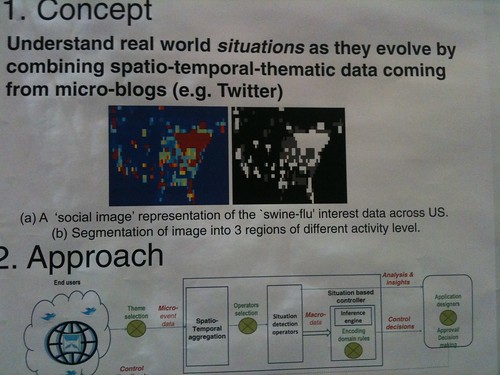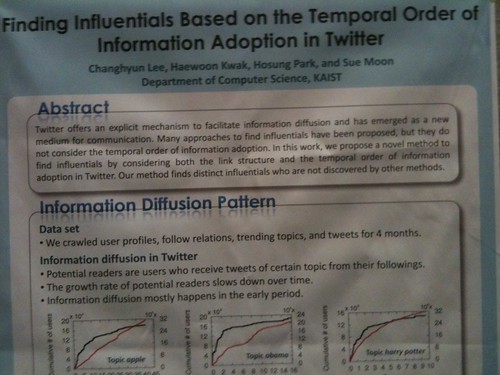A few weeks ago I had the opportunity to attend WWW2010 (pronounced Dub-Dub-Dub Twenty-Ten) and take part in the FutureWeb 2010 conference. The FutureWeb 2010 conference was just one out of four mini-conferences/tracks held during WWW2010. If you’re not familiar with WWW2010 it was created by Tim Berners-Lee who’s also known as the father of the Internet back in 1989.
I was going to write a long review about both conferences called “5 reasons why WWW2010 is the most important Internet conference in the world” but my friends Bora Zivkovic @Boraz and Gwynne Murphy @GwynneMurphy have written a two awesome post summarizing both conferences. But here’s my 5 reasons why I think WWW2010 is the most important Internet conference in the world along with a brief history of the conference and links to Bora’s and Gwynne’s articles. Also a link to the wrap-up post from the Future of Social Networks panel.
5 reasons why WWW2010 the most important Internet conference in the world:
1. History
WWW2010 is the first Internet conference in the world
2. The people
Not only was Tim Berners-Lee the founder of Internet was there but so Vint Cert, Vice President at Google, Bebo White who created the first web page and representatives from Microsoft, Yahoo, Facebook, Red Hat, iContact, Ask.com, Google and more where in attendance.
3. The content/context of the sessions/panel
I’ve been to a lot of Internet conferences and I must say that the context of the sessions at WWW2010 were great and very informational.

4. The Location
WWW2010 was held in Raleigh, NC, well this one is a shameless plug for NC and with both UNC & NC State helping organize the conference it was great to WWW2010 in Raleigh, NC. I keep telling the world that NC is awesome and being that WWW2010 travels across the world each year I was proud to see in held in Raleigh and I hope everyone who attended had a chance to see how awesome NC is.
5. The posters/case studies/white papers
There was a poster room at WWW2010 where students showcased cased studies from various topics such as The Framework for Trust Establishment and Assessment on the Web of Data and Finding Influentials Based on The Temporal Order of Information Adoption in Twitter are just two examples of the some awesome research on display during the conference.

History of WWW via http://www2010.org/www/about/history/
The World Wide Web was first conceived in 1989 by Tim Berners-Lee at CERN in Geneva, Switzerland. The first conference of the series, WWW1, was held at CERN in 1994 and organized by Robert Cailliau. The IW3C2 was founded by Joseph Hardin and Robert Cailliau later in 1994 and has been responsible for the conference series ever since. Except for 1994 and 1995 when two conferences were held each year, WWWn became an annual event held in late April or early May. The location of the conference rotates among North America, Europe, and Asia. In 2001 the conference designator changed from a number (1 through 10) to the year it is held; i.e., WWW11 became known as WWW2002, and so on.
Read more..

FutureWeb2010, Fred Stutzman, founder of ClaimID, moderated the panel on the future of the Web and social networks. Panelists includedCHRIS DIBONA of Google, DAVE RECORDON of Facebook, HENRY COPELAND of Blogads, ZEYNEP TUFEKCI of UMBC and WAYNE SUTTON, networks consultant.
Read More: Panelists discuss the future of social networks on the Web
Bora’s Post: Public vs. Publicized: Future of the Web at WWW2010
Number 5 in my book is diversity. While the attendees as a whole seemed quite balanced and diverse, the talks and panels were quite white-male-dominated or white-male-exclusive, with just a couple of great exceptions, most notably danah boyd. The opposing goals of having the people with the greatest name recognition (which are marketing gold for a meeting) or having a diverse group in which everyone feels comfortable and “an insider” are hard to reconcile.
Gwyne’s Post: My Experience at the WWW2010 Conference
Vint Cerf’s keynote talk on Wednesday about Bandwidth, Clouds and Things, Oh My! really made me think about this 37 year old thing called the internet that keeps us all connected. As Americans we take the network’s connectivity for granted, while the internet has only reached 20% of Asia. Cerf also spoke about the many challenges that we face today through growing access methods.
Thanks:
A big thanks to the WWW2010 conference organizers and a special thanks to Paul Jones @smalljones, Bora Zivkovic @Boraz, and Fred Stutzman fstutzman for allowing me to take part in such an awesome historic event.
Photo Gallery:


